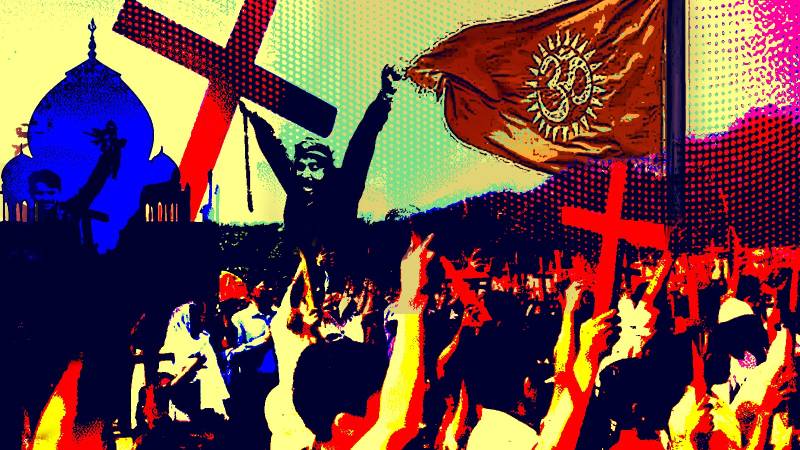
Two years after the tragic incident involving a Sri Lankan man accused of blasphemy – who faced a brutal death at the hands of an enraged mob – another distressing chapter has unfolded in our nation. An irate mob set fire to churches and wreaked havoc on Christian homes in Jaranwala, Faisalabad, driven by blasphemy claims.
The Christian community is grappling with the aftermath of the attack, particularly poignant as this occurred just days after the National Minority and Independence Days, where they celebrated and prayed for their homeland's safety within the very churches that were torched. Now, they are forced to seek refuge and safety, having spent a night in open fields and migrating to new places.
I want to illuminate two facets concerning these incidents. Firstly, it's vital to acknowledge that no one from the minority community would ever contemplate desecrating the Holy Quran. Surprisingly, there's a higher incidence of blasphemy accusations against Muslims than minority members. Data from a prominent organization (NCJP 2023) dedicated to minority rights reveals that in Pakistan, a staggering 253 individuals faced blasphemy accusations in 2022. Among them, three were Christians, 48 were Ahmadis, 196 were Muslims, one was a Hindu, and five were unidentified.
The culprits involved are well aware of these tactics, which is why the attacks have been taking place along the same pattern for decades
This raises the question: How could a Muslim disrespect their Holy Book? This, perhaps, suggests that such accusations and acts have origins in motives that are perhaps personal in nature.
Secondly, culprits consistently resort to mob attacks rather than individual assaults, exploiting the voids in our legal system. This exposes the frailty of our system. Records indicate that justice has never been served in such cases. Whenever a mob attack occurs, the responsibility of the attack becomes divided. Although mass arrests take place due to mob involvement, instead of singular accountability, the accused keep receiving bail one by one until the case is dismissed on weak legal grounds. The culprits involved are well aware of these tactics, which is why the attacks have been taking place along the same pattern for decades.
Another aspect to consider is that mobs often assemble in response to announcements made from loudspeakers installed in mosques. However, the responsibility ultimately falls on the mob while the main instigators manage to escape. Holding the source of the mob accountable would not only discourage such dangerous gatherings in the future but also make them more hesitant next time.
For two generations, they diligently saved to build these modest homes and furnished them with basic necessities. Their life's earnings, often the result of sacrifices spanning generations, have been wiped out
Consider the victims – even if they avoided casualties, such incidents induce profound trauma. The ferocity of mob attacks embeds lasting fear, ensnaring the accused within their homes. The impact on minors, women, and elders subjected to violent slogans cannot be ignored. For minors, the trauma endures, potentially altering their lives permanently. Their path to returning to a normal life involving education, employment, and social interaction with Muslims would be incredibly difficult.
The economic losses have devastated their houses, shops, and businesses, leaving them with little more than the clothes on their backs and a scarcity of food to sustain them. They are primarily individuals who were already surviving on meagre wages, residing in cramped homes shared among as many as 18 relatives. For two generations, they diligently saved to build these modest homes and furnished them with basic necessities. Their life's earnings, often the result of sacrifices spanning generations, have been wiped out. The pressing question remains: "How can we rebuild our lives here once more?"
The challenges do not end there. The symbolic white part of the Pakistani flag has become cloudy – a minority voice mourns that this hue now symbolizes their coffins.
Writers, intellectuals, and lawyers are grappling with apprehension. They fear repercussions for discussing such sensitive topics. The hesitancy of law enforcement to act promptly compounds the issue. Building the capacity of these officials is vital to manage such crises effectively.
The escalating occurrences of violence, intolerance, and bias targeted at religious and sectarian minority groups demand urgent attention
Comprising about two percent of the population, Christians have consistently demonstrated their loyalty to the country since its establishment, engaging in various professions. The nonviolent, tolerant, and peaceful conduct of Christians is readily observable within the society. Remarkably, there has never been any instance of a Christian being implicated in acts of terrorism, treason, or violent conduct. They have been fulfilling their role as responsible citizens effectively; it is now the responsibility of the state to ensure their protection.
The incidence of religion-driven violence in Pakistan has surged since the country deemed blasphemy punishable by death, a change that has unfortunately contributed to the escalation of violent behaviours. The escalating occurrences of violence, intolerance, and bias targeted at religious and sectarian minority groups demand urgent attention. Religious persecution represents a severe assault on human dignity, entailing profound humiliation and the erosion of human rights.
While grappling with these challenges, it is imperative for the government to take decisive actions while ensuring that no strategies or patterns of attack go unpunished —whether it's mob attacks, extrajudicial killings in custody, or incidents occurring outside the courtroom. The media, too, has a role, spotlighting incidents and maintaining momentum till justice prevails.

